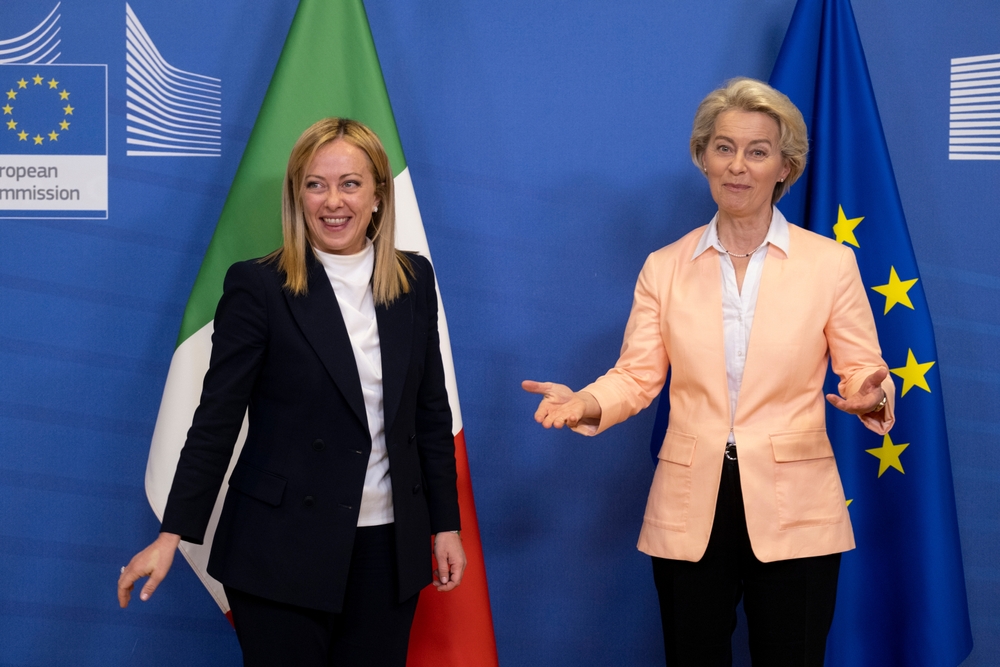Strategic engagement is the best course for US allies.
Europe is preparing for the worst. The European Commission president, Ursula von der Leyen, stated bluntly in an interview with Germany’s Die Zeit, “the West as we knew it no longer exists.” Doom has many dimensions: democratic backsliding, constitutional crises, a looming trade war, a US-Russian rapprochement, and more besides.
This gloomy prospect of “Westlessness” was first highlighted by the Munich Security Conference in 2020. But five years on, we are not there yet. And it may still be avoidable. Visiting the White House last week, for the first meeting with a European leader since the administration launched its tariff blitz, the Italian prime minister Giorgia Meloni invoked Donald Trump’s help. “The goal for me is to make the West great again, and I think we can do it together,” she said. “We can,” replied the president.
That is not exactly a full-throated restatement of the Atlantic Charter of 1941, and commentators were quick to criticize Meloni for failing to secure a trade breakthrough. But the Italian leader did show it was possible to establish common ground (bashing the extremes of wokery, highlighting successes in curbing migration) and to cement friendly personal relations. She steered President Trump into retracting his bizarre suggestion that Ukraine had started the war with Russia. And—despite her euro-sceptic roots—she did not break ranks with the EU, nor seek to undermine its position.
The broader mood music has changed, too. Allies are no longer whipping boys; they may even be useful. Vice-President JD Vance followed up with a friendly visit to Rome, his first to Europe since his combative appearance at the Munich Security Conference in February. A presidential visit to the Italian capital for a summit with EU leaders is now under discussion. If that proves cordial, it offers hope for the upcoming NATO summit in June in The Hague.
Keep the prosecco on ice for now. Transatlantic relations are still fragile and bruised, and a descent into the disaster of a dog-eat-dog world is still worryingly close. But where Meloni has been, others can follow. European leaders do not have to like President Trump’s style to find something useful to talk about.
And the alternatives are worse. Sulking at home, or sniping publicly at the US president, is unlikely to make things better. The fire-breathing critics may gain domestic applause, but they cannot explain how their stance is going to improve the practical outcome. Americans are not suddenly going to say to Europeans: “Thank you so much for telling us that our president is a moron, and that his team comprise incompetents, grifters, and fanatics. Thank you too for the frosty disdain with which you have treated us. It has brought us to our senses. Everything will change now.”
Europeans should also resist the temptation to sound gleeful if and when the US reverses course. They have made plenty of mistakes, too. Remedying those errors should be the other leg of their policy. “Move fast and make things” should be the motto (not “break things” as the US tech broligarchy has it). Europe needs new institutions for its defense and security, and better decision-making in its old ones, not least to promote growth and innovation.
This is not risk-free: some in the administration prefer a weak, divided Europe to a united and muscular one. But the more the Europeans do, the better prepared they are in the case of catastrophe, and the likelier they are to avoid it. As von der Leyen also noted in her interview, “reality is a strong ally.” And reality, on both sides of the Atlantic, is winning.
*Edward Lucas is a Non-resident Senior Fellow and Senior Advisor at the Center for European Policy Analysis (CEPA).
**Europe’s Edge is CEPA’s online journal covering critical topics on the foreign policy docket across Europe and North America. All opinions expressed on Europe’s Edge are those of the author alone and may not represent those of the institutions they represent or the Center for European Policy Analysis. CEPA maintains a strict intellectual independence policy across all its projects and publications.






